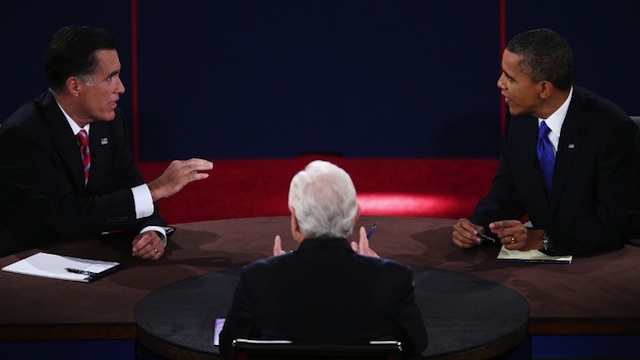SUMMARY
This is AI generated summarization, which may have errors. For context, always refer to the full article.

Delray beach, Florida, United States – Barack Obama and Mitt Romney took their head-to-head battle for the US presidency to key swing states Tuesday after a feisty but inconclusive final debate.
Post debate polling showed Obama winning Monday night’s faceoff but analysts said Romney, who adopted more dovish-sounding foreign policy prescriptions that differed little from the president’s, may have been helped by the encounter.
“The fact that Mr Romney was able to show himself to not be the dangerous, wild conservative that Obama has been trying to portray him as, that may help him,” said Christopher Arterton, a political science professor at George Washington University.
“That may continue some of the flight that we have seen towards Romney, particularly in states he has to win, Florida and Ohio”.
The focus will likely return to the economy as the two campaign in the key battlegrounds expected to decide the election, with the president speaking in Florida and Ohio and his Republican rival heading west to Nevada and Colorado.
Economic woes loom far larger than any foreign threat, and it will take several days to gauge whether Monday’s clash had any impact on tied up polls with two weeks to go before the November 6 elections.
Obama had the best lines of the night and sharply cross-examined Romney on his approach to Syria, Iran and trade rows with China, accusing him of “airbrushing history” by dumping earlier hawkish conservative positions.
“I know you haven’t been in a position to actually execute foreign policy, but every time you’ve offered an opinion, you’ve been wrong,” Obama said, accusing his opponent of being “all over the map” on a wide range of issues.
The Republican, who has spent months attempting to paint the president as a weak appeaser, took a milder tone, actually backing much of the substance of the current administration’s global strategy.
In a clear bid to moderate his image, Romney endorsed Obama’s decision to withdraw from Afghanistan in 2014, supported the president’s lethal drone war against terror suspects and congratulated him on hunting down Osama bin Laden.
Romney vowed to press China harder on trade and currency issues but toned down earlier rhetoric, following warnings that his approach could spark a trade war.
“We can be a partner with China. We don’t have to be an adversary in any way, shape or form,” he said, despite his vow to brand Beijing a currency manipulator on day one of his presidency.
Oddly, neither candidate mentioned the eurozone crisis — widely seen as the country’s biggest external economic threat — aside from Romney reprising his warning that the debt-laden US economy under Obama was “heading toward Greece.”
The president scored the most Twitter-worthy remark, when he dismissed Romney’s claims that he had scaled back the military to a level not seen since the early 20th century.
“Well, governor, we also have fewer horses and bayonets because the nature of our military’s changed,” he said, to laughter from the audience.
The “horses and bayonets” barb caused Twitter message volume during the debate to hit a peak of 105,767 tweets, the micro-blogging service said.
Arterton said both Obama and Romney had performed well in the debate but that the “ground game” in closely fought states would be decisive.
“We’re really down to both sides mobilizing whatever resources they have to get their voters to the polls,” he told AFP.
The rivals are effectively tied in national polls after Romney surged following his first debate win in early October and started chipping away at Obama’s foundation in the swing states that will decide the election.
“It’s still quite up in the air,” said Charles Franklin, co-founder of Pollster.com and a politics professor at the University of Wisconsin-Madison.
“I think we are, at the moment, close enough that you could imagine a cliffhanger that comes down to a single state’s electoral votes.” –Tangi Quemener, Agence France-Presse
Add a comment
How does this make you feel?
There are no comments yet. Add your comment to start the conversation.